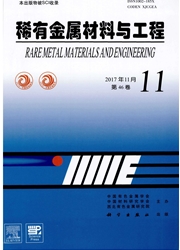

 中文摘要:
中文摘要:
以硝酸钙和硅酸钠为原料,采用化学共沉淀法合成了适合作为生物材料的硅酸钙粉体,并利用放电等离子体烧结工艺(Spark Plasma Sintering)烧结硅酸钙陶瓷(常温相为β相)。为了探讨合适的烧结工艺参数,分别采用了不同的烧结温度(850~1000℃),不同的保温时间(1~10min)和不同的加载压力(20~50MPa)进行烧结。测了这一系列不同烧结工艺参数下得到的块体的抗弯强度、硬度、断裂韧性等力学性能。结果表明,在950℃可以制得很致密的硅酸钙材料,其力学性能比其它方法得到的材料大为提高。延长保温时间及增加烧结压力,抗弯强度和硬度均在一定范围内增加,而断裂韧性则呈现相反趋势,因此,要根据材料的应用需要来确定最佳工艺参数。
 英文摘要:
英文摘要:
Dense β-CaSiO3 (low temperature phase) ceramics were fabricated by spark plasma sintering (SPS), β-CaSiO3 powder were synthesized by chemically precipitated using NaSiO3·9H2O and Ca(NO3)·4H2O as raw material. We changed the three sintering parameters, them are respectively sintering temperature, sintering pressure and holding time to prepare several different samples and measured their mechanical properties. The results show that the mechanical properties of β-CaSiO3 ceramics prepared at 950 β were great promoted. When increasing the sintering pressure or holding time, flexural strength and Vickers hardness increase but the fracture toughness decreases. As the mutative trend of flexural strength and fracture toughness are inconsistent, the sintering parameter should be adjusted according to practical need.
 同期刊论文项目
同期刊论文项目
 同项目期刊论文
同项目期刊论文
 Preparation and microstructure of ZrB2-SiC composite fabricated by the spark plasma sintering-reacti
Preparation and microstructure of ZrB2-SiC composite fabricated by the spark plasma sintering-reacti Interfacial evolution behavior and reliability evaluation of CoSb3/Ti/MoCu thermoelectric joints dur
Interfacial evolution behavior and reliability evaluation of CoSb3/Ti/MoCu thermoelectric joints dur Ti3SiC2-(Ti3SiC2-SiC) functionally graded materials by spark plasma sintering- reactive synthesis (S
Ti3SiC2-(Ti3SiC2-SiC) functionally graded materials by spark plasma sintering- reactive synthesis (S Super-hydrophobic surface of bulk carbon nanotubes compacted by spark plasma sintering followed by m
Super-hydrophobic surface of bulk carbon nanotubes compacted by spark plasma sintering followed by m Effect of holding time and pressure on properties of ZrB2–SiC composite fabricated by the spark plas
Effect of holding time and pressure on properties of ZrB2–SiC composite fabricated by the spark plas Modeling Tempreature Gradient Evolution of CoSb3 Material for Thermoelectric Devices during Spark Pl
Modeling Tempreature Gradient Evolution of CoSb3 Material for Thermoelectric Devices during Spark Pl Enhanced mechanical properties in Ag-particle-dispersed PZT piezoelectric composites for actuator ap
Enhanced mechanical properties in Ag-particle-dispersed PZT piezoelectric composites for actuator ap Effect of TiC content on the microstructure and properties of Ti3SiC2-TiC composites in-situ fabrica
Effect of TiC content on the microstructure and properties of Ti3SiC2-TiC composites in-situ fabrica Mechanical properties of CaSiO3/Ti3SiC2 composites and hydroxyapatite forming ability in simulated b
Mechanical properties of CaSiO3/Ti3SiC2 composites and hydroxyapatite forming ability in simulated b 期刊信息
期刊信息
